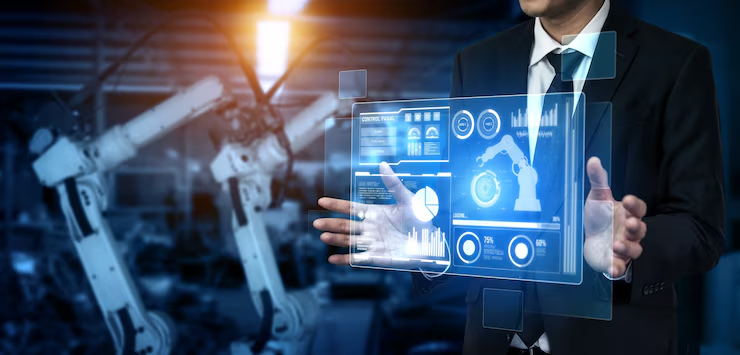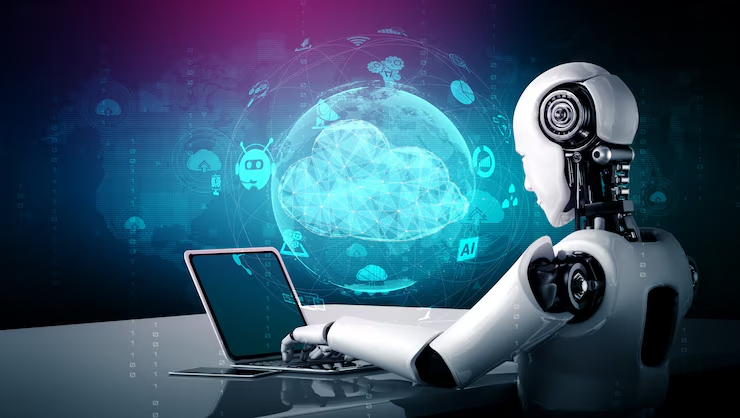AI is progressively becoming the smart assistant behind a myriad of operational decisions for businesses. When integrated into Enterprise Resource Planning (ERP) systems, AI not only automates manual tasks but also provides forecasts, risk warnings, and strategic suggestions based on real-time data.
This article will help you understand the role of AI-integrated ERP in businesses and why this integration is a "leap forward" for truly effective digital transformation.
1. What is AI and why integrate it with ERP?

1.1 What is AI? Understanding Artificial Intelligence in the digital age
AI (Artificial Intelligence) is a technology that simulates human-like capabilities in thinking, learning, processing, and decision-making – but with superior speed and scale. AI can analyze big data, identify patterns, make predictions, and automate tasks that previously required human intervention.
No longer a futuristic concept, AI is already present in many business activities: from customer support chatbots and demand forecasting systems to user behavior analysis models. What's special is that the longer AI is used, the "smarter" it becomes, thanks to its deep learning capabilities and real-time updates.
1.2 What is ERP? The foundation of modern enterprise management
ERP (Enterprise Resource Planning) is an enterprise resource planning system that enables the synchronized management of departments such as accounting, human resources, inventory, production, sales, and more, all within a single platform.
ERP helps standardize processes, ensure seamless data flow between departments, minimize errors, and increase overall organizational efficiency. From tracking orders and managing finances to evaluating business performance, ERP is the "backbone" that helps businesses operate efficiently and transparently.
Today, with the support of AI, ERP systems are not just recording tools – they are also platforms for analysis, forecasting, and strategic decision-making.
1.3 Why do Businesses need to integrate AI into their ERP systems?
Integrating artificial intelligence (AI) into ERP systems offers numerous practical benefits, helping businesses not only optimize operations but also enhance their competitiveness in the market:
- Intelligent Process Automation: AI helps automate repetitive tasks such as data entry, invoice classification, and inventory forecasting, thereby saving time and minimizing manual errors.
- Data-Driven Decision Making: AI can analyze large datasets, detect trends, and provide intelligent suggestions, enabling business leaders to make faster and more accurate decisions.
- More Accurate Forecasting & Planning: Thanks to machine learning models, AI can predict market demand, sales fluctuations, or supply chain risks – helping businesses prepare and adjust plans promptly.
- Enhanced User Experience: With virtual assistants and AI chatbots, ERP systems become more user-friendly, supporting users in quickly and conveniently retrieving information and processing operations.
- Optimized Operational Costs: AI integration helps reduce personnel costs, increase productivity, and limit losses, which is particularly important for small and medium-sized enterprises (SMEs) during resource optimization.
- Rapid Adaptation to Change: In a volatile business environment, AI makes ERP systems more flexible, continuously learning and adapting to new market conditions and customer behaviors.
2. The superior benefits of combining AI with ERP systems

Integrating AI into an ERP system isn't just a technological upgrade; it's a transformative shift in how businesses make decisions, operate, and grow. AI elevates ERP beyond its traditional role of mere data recording, turning it into an "intelligent coordination hub" where data is processed and operational workflows are optimized for seamless execution.
Accurate forecasting – enabling fast and effective decision-making
AI empowers ERP systems to analyze historical data, identify consumer trends, market demands, inventory fluctuations, and production costs. This capability leads to precise forecasts, allowing managers to make quicker decisions without waiting for traditional consolidated reports.
Intelligent automation – minimizing manual tasks, boosting efficiency
While ERP can automate processes, combining it with AI takes automation to a more intelligent level. It enables the system to learn from user behavior, suggest next steps, identify exceptions, and resolve errors without manual intervention. For instance, the system can recommend optimal orders, automatically approve transactions based on thresholds, or efficiently route workflows.
Optimizing operational costs and increasing employee productivity
AI helps uncover inefficiencies in processes (e.g., phantom inventory, idle time between processing steps), suggesting ways to reduce costs. Simultaneously, when employees are freed from repetitive tasks, they can dedicate their time to more creative and strategic activities.
Enhancing customer experience through personalization & faster service
AI within ERP can analyze customer behavior data to recommend products, optimize order and delivery processes, or provide early warnings of potential issues. This allows businesses to serve customers more quickly, accurately, and in alignment with their specific needs.
Better risk & fraud control through proactive alerts
AI enables ERP systems to detect anomalies in transactions, financial activities, or supply chains, thereby preventing risks or fraud at an early stage. This is something traditional ERP systems struggle with without AI's support for deep and instantaneous analysis.
Flexible scalability – adapting well to dynamic environments
AI helps ERP learn and adapt more quickly to changes in operations, market conditions, or user behavior. With its continuous learning and improvement capabilities, the ERP system won't remain rigid; instead, it will become increasingly flexible, intelligent, and suitable for fast-growing businesses.
3. Challenges and considerations when implementing AI in ERP

While offering numerous significant benefits, integrating Artificial Intelligence (AI) into an Enterprise Resource Planning (ERP) system is not merely about "connecting another smart tool." It represents a journey of transformation in mindset, infrastructure, and operations. Below are common challenges and crucial considerations for businesses:
Data – the foundation and the biggest hurdle
AI only performs effectively when "fed" with complete, clean, and structured data. However, many businesses currently store data in a fragmented, inconsistent, or inaccurate manner. If not properly handled, the AI will learn incorrectly or provide imprecise recommendations.
Lack of internal capability to implement and operate AI
AI is not a "plug-and-play" tool. Businesses need a team that understands how to use, evaluate, and monitor AI. A shortage of in-house personnel with a deep understanding of the technology can lead to slow, misdirected, or underutilized implementation projects.
Data security and privacy risks
The more powerful AI becomes, the more it relies on data – which increases the risk of information exposure if appropriate security solutions are not in place.
Shifting operational mindset and accepting "machine decisions"
One of the significant but often overlooked barriers is the human factor. Employees may fear AI replacing their jobs, distrust system recommendations, or be slow to adapt to automated processes.
Implementing AI in ERP is a significant change that requires thorough preparation in terms of data, infrastructure, people, and management mindset. Once businesses overcome these initial hurdles, the reward will be an intelligent, flexible, and leading operational system in the digital era.
4. Conclusion
Integrating AI into ERP systems is no longer just a trend; it is becoming a new standard that helps businesses enhance operational efficiency, make quick decisions, and optimize resources. From process automation, intelligent data analysis, to trend prediction and personalized customer experiences – AI is truly acting as an "omnipotent assistant" in the digital transformation journey.
In an increasingly competitive landscape, businesses that leverage the power of AI in ERP will gain a significant advantage in adapting, innovating, and achieving sustainable growth. Now is the time to start exploring and harnessing AI's potential – not just to move faster, but to go further. Contact us immediately to receive free materials and consultation on the latest technology solutions.